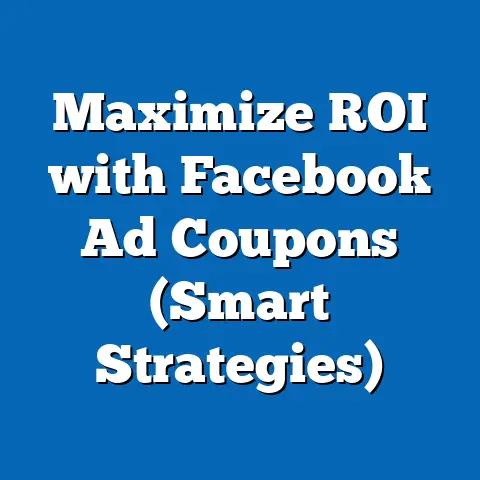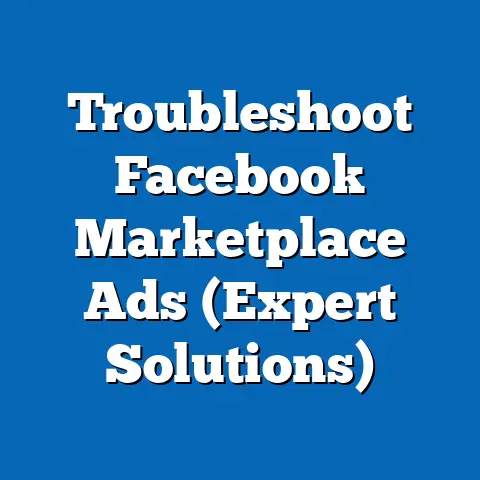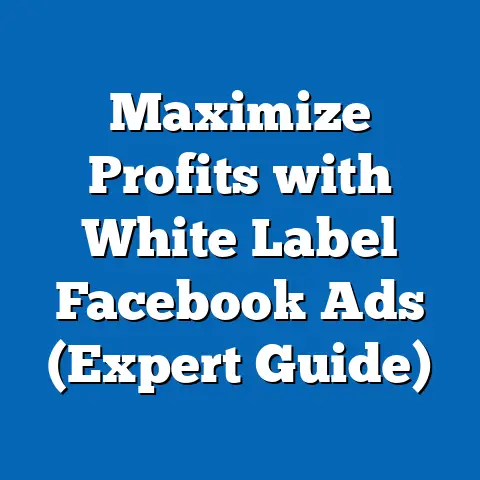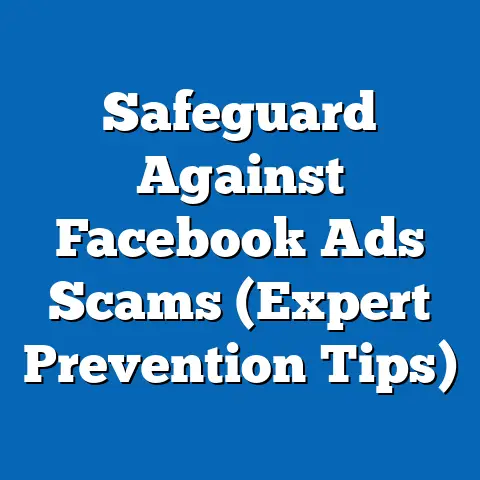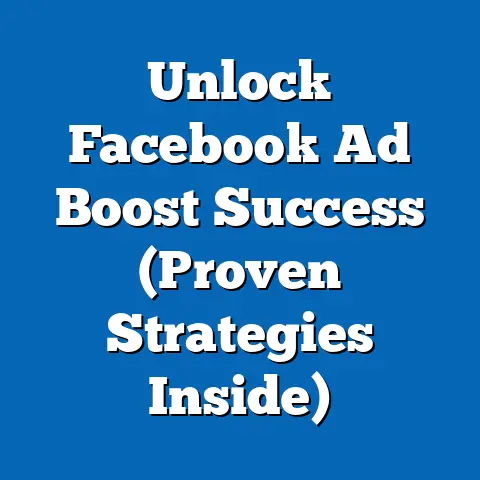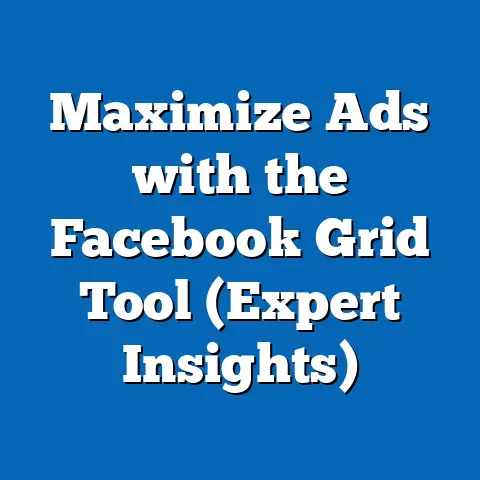Unlock Home Value with Facebook Ads (Expert Tips Inside)
Have you ever felt the frustration of watching your “For Sale” sign sit stagnant in your yard, month after month?
I’ve been there, and I know the feeling.
It’s a mix of anxiety, disappointment, and the nagging thought that you’re missing something.
You meticulously maintain the lawn, the interior is spotless, yet potential buyers seem to pass right by.
Let me paint a picture.
Imagine a modest home nestled in a quiet suburban neighborhood.
The “For Sale” sign stands proudly, but it’s been there for what feels like an eternity.
The owner, let’s call her Sarah, diligently checks her email, hoping for that one inquiry that could change everything.
But the inbox remains stubbornly empty.
The yard is pristine, the house is inviting, yet the listing languishes, failing to capture the attention of eager buyers.
Sarah is starting to lose hope, the weight of uncertainty pressing down on her.
Now, fast forward a few weeks.
The same “For Sale” sign is still there, but the atmosphere is completely different.
There’s a palpable buzz of activity around the home.
Sarah is now juggling multiple inquiries daily, her phone buzzing incessantly with interested buyers.
What changed?
Sarah discovered the power of Facebook ads.
The home is now showcased in beautifully crafted ads, highlighting its best features and capturing the attention of potential buyers.
Social media engagement is skyrocketing, and Sarah feels empowered and excited, knowing she’s on the cusp of selling her home for top dollar.
Section 1: Understanding the Importance of Home Value
Before we jump into the specifics of Facebook ads, it’s crucial to understand the fundamental concept of home value.
What does it truly mean, and why is it so important?
Defining Home Value
Home value is more than just a number; it’s a complex interplay of factors that determine what a buyer is willing to pay for your property.
It’s the perceived worth of your home in the current market, and it directly impacts your financial outcome when you decide to sell.
From my experience, homeowners often underestimate the importance of actively managing their home’s perceived value.
They might focus solely on the physical aspects of the property, like renovations or landscaping, without considering the crucial role of marketing and presentation.
Factors Influencing Home Value
Several key factors contribute to your home’s value:
- Location: This is often cited as the most important factor.
Proximity to good schools, amenities, transportation, and employment centers significantly impacts value.
A home in a desirable neighborhood will always command a higher price. - Market Trends: The overall real estate market, including interest rates, supply and demand, and economic conditions, plays a significant role.
In a seller’s market, with high demand and low inventory, home values tend to rise. - Property Features: The size, layout, condition, and features of your home are critical.
Updates like renovated kitchens and bathrooms, energy-efficient appliances, and desirable amenities like a pool or a finished basement can increase value. - Comparable Sales (Comps): What similar homes in your area have recently sold for is a crucial benchmark.
Real estate agents use comps to determine a fair market value for your property. - Marketing and Presentation: This is where Facebook ads come in!
How you present your home to potential buyers can significantly impact their perception of its value.
A well-marketed home, with professional photos and compelling descriptions, will attract more attention and potentially higher offers.
Amplifying Home Value Through Marketing
While you can’t change your home’s location, you can control how you market it.
This is where strategic marketing comes into play.
It’s about highlighting your home’s best features, appealing to the right buyers, and creating a sense of urgency.
I’ve seen firsthand how a well-executed marketing strategy can dramatically increase a home’s perceived value.
It’s not just about showing the house; it’s about telling a story, creating an emotional connection, and convincing buyers that your home is the perfect fit for their needs.
Key Takeaway: Understanding the factors that influence home value is the first step in maximizing your return on investment.
Don’t underestimate the power of marketing and presentation in amplifying your home’s perceived worth.
Section 2: Why Facebook Ads?
In today’s digital age, traditional real estate marketing methods are no longer sufficient.
The rise of digital marketing has revolutionized the industry, and Facebook ads have emerged as a powerful tool for reaching potential buyers.
The Rise of Digital Marketing in Real Estate
Gone are the days of relying solely on newspaper ads and open houses.
Today’s buyers are online, actively searching for properties on websites like Zillow, Realtor.com, and, increasingly, Facebook.
Digital marketing offers several advantages over traditional methods:
- Wider Reach: Reach a larger audience of potential buyers, both locally and nationally.
- Targeted Advertising: Precisely target your ideal buyer based on demographics, interests, and behaviors.
- Measurable Results: Track your campaign’s performance and make data-driven adjustments to optimize your results.
- Cost-Effectiveness: Often more affordable than traditional advertising, especially when targeting specific audiences.
Facebook Ads: A Proven Strategy for Real Estate
Facebook ads have become a go-to strategy for real estate agents and homeowners alike.
Why?
Because they work.
- Massive Audience: Facebook boasts billions of active users, providing unparalleled reach to potential buyers.
- Granular Targeting: Target users based on demographics (age, location, income), interests (real estate, home improvement), behaviors (recent homebuyers, those interested in moving), and more.
- Visual Appeal: Facebook is a visual platform, allowing you to showcase your property with stunning photos and videos.
- Engagement and Interaction: Encourage engagement through comments, shares, and likes, fostering a sense of community and interest.
- Retargeting Capabilities: Retarget users who have previously interacted with your ads or visited your website, keeping your property top of mind.
Statistics and Data: The Proof is in the Numbers
The effectiveness of Facebook ads for real estate is backed by compelling data:
- A recent study by the National Association of Realtors (NAR) found that 44% of buyers first looked online for properties.
- According to Facebook, real estate advertisers have seen a significant increase in lead generation through the platform.
- Numerous case studies demonstrate how Facebook ads have helped real estate agents generate leads, increase website traffic, and ultimately sell properties faster.
Unique Advantages of Facebook
Facebook offers several unique advantages that make it an ideal platform for real estate advertising:
- Audience Reach: With its massive user base, Facebook provides unmatched reach to potential buyers.
- Targeting Capabilities: Facebook’s sophisticated targeting options allow you to pinpoint your ideal buyer with incredible precision.
- Cost-Effectiveness: Compared to traditional advertising methods, Facebook ads can be significantly more affordable, especially when targeting specific audiences.
- Visual Platform: Facebook’s visual nature allows you to showcase your property with stunning photos and videos, capturing the attention of potential buyers.
- Community Building: Facebook allows you to create a community around your property, fostering engagement and interest.
I remember one instance where a client of mine, a real estate agent, was struggling to sell a luxury condo.
We implemented a targeted Facebook ad campaign, focusing on affluent individuals in the area who had shown interest in luxury real estate.
The results were remarkable.
Within weeks, we generated several qualified leads, and the condo was sold for the asking price.
Key Takeaway: Facebook ads are a powerful tool for real estate marketing, offering unparalleled reach, targeting capabilities, and cost-effectiveness.
By leveraging the platform’s unique advantages, you can significantly increase your home’s visibility and attract the right buyers.
Section 3: Crafting a Compelling Facebook Ad Campaign
Creating an effective Facebook ad campaign requires careful planning and execution.
It’s not enough to simply throw up a few photos and hope for the best.
You need to craft a compelling message that resonates with your target audience and motivates them to take action.
Steps to Create an Effective Campaign
Here are the key steps to creating a successful Facebook ad campaign for real estate:
- Define Your Goals: What do you want to achieve with your campaign?
Are you looking to generate leads, increase website traffic, or schedule showings? - Identify Your Target Audience: Who is your ideal buyer?
Consider their demographics, interests, and behaviors. - Choose the Right Ad Format: Facebook offers a variety of ad formats, including single image ads, video ads, carousel ads, and collection ads.
Choose the format that best showcases your property and aligns with your goals. - Write Compelling Ad Copy: Your ad copy should be concise, engaging, and persuasive.
Highlight your home’s key features and benefits, and include a clear call to action. - Use High-Quality Visuals: Your photos and videos are the first thing potential buyers will see.
Invest in professional photography to showcase your property in the best possible light. - Set Your Budget and Bidding Strategy: Determine how much you’re willing to spend on your campaign and choose a bidding strategy that aligns with your goals.
- Track Your Results and Optimize: Monitor your campaign’s performance and make adjustments as needed to improve your results.
The Importance of High-Quality Visuals
In the world of real estate, visuals are everything.
Potential buyers want to see what your home looks like, both inside and out.
High-quality photos and videos are essential for capturing their attention and creating a positive first impression.
- Professional Photography: Invest in professional photography to showcase your property in the best possible light.
A professional photographer will know how to capture the best angles, lighting, and composition to make your home look its best. - Staging: Stage your home to make it look more appealing to potential buyers.
This might involve decluttering, rearranging furniture, and adding decorative touches. - Video Tours: Consider creating a video tour of your home to give potential buyers a virtual walkthrough.
This can be a great way to showcase the layout and flow of your property.
Writing Compelling Ad Copy
Your ad copy is your opportunity to tell a story and connect with potential buyers on an emotional level.
It should be concise, engaging, and persuasive.
- Highlight Key Features and Benefits: Focus on the features and benefits that will appeal to your target audience.
For example, if you’re targeting families, highlight the proximity to good schools and parks. - Use Strong Verbs and Adjectives: Use strong verbs and adjectives to create a sense of excitement and urgency.
- Include a Clear Call to Action: Tell potential buyers what you want them to do, such as “Learn More,” “Schedule a Showing,” or “Visit Our Website.”
- Keep it Concise: People have short attention spans, so keep your ad copy concise and to the point.
I’ve learned that focusing on the emotional connection is crucial.
Instead of just listing features, describe the lifestyle your home offers.
“Imagine waking up to breathtaking views every morning” is far more compelling than “This home has a view.”
Key Takeaway: Crafting a compelling Facebook ad campaign requires careful planning, high-quality visuals, and persuasive ad copy.
By focusing on your target audience and highlighting your home’s unique features and benefits, you can create a campaign that generates leads and drives sales.
Section 4: Targeting the Right Audience
One of the greatest strengths of Facebook advertising is its ability to target specific audiences.
You can pinpoint your ideal buyer based on demographics, interests, behaviors, and more.
This allows you to reach the people who are most likely to be interested in your property, maximizing your return on investment.
Facebook’s Targeting Features
Facebook offers a wide range of targeting options, including:
- Demographics: Target users based on age, gender, location, education, income, and more.
- Interests: Target users based on their interests, such as real estate, home improvement, gardening, and more.
- Behaviors: Target users based on their behaviors, such as recent homebuyers, those interested in moving, and those who have visited real estate websites.
- Custom Audiences: Create custom audiences based on your existing customer lists, website visitors, or app users.
- Lookalike Audiences: Create lookalike audiences based on your custom audiences.
Facebook will find users who are similar to your existing customers, expanding your reach to new potential buyers.
Identifying and Segmenting Your Ideal Audience
Before you start creating your ad campaign, take some time to identify and segment your ideal audience.
Consider the following questions:
- Who is your ideal buyer? Are they young professionals, families with children, or retirees?
- What are their interests and hobbies? Do they enjoy gardening, cooking, or traveling?
- What are their financial capabilities? Can they afford your home?
- Where do they live? Are they local to your area or are they looking to relocate?
Once you have a clear understanding of your ideal buyer, you can use Facebook’s targeting options to reach them.
For example, if you’re selling a family-friendly home in a good school district, you might target families with children who are interested in education and family activities.
If you’re selling a luxury condo, you might target affluent individuals who are interested in luxury real estate and travel.
Using Custom Audiences and Lookalike Audiences
Custom audiences and lookalike audiences are powerful tools for maximizing your reach and targeting.
- Custom Audiences: Upload your existing customer lists (email addresses, phone numbers) to Facebook to create a custom audience.
This allows you to target people who have already expressed interest in your business. - Lookalike Audiences: Use your custom audience as a seed audience to create a lookalike audience.
Facebook will find users who are similar to your existing customers, expanding your reach to new potential buyers.
I’ve found that lookalike audiences are particularly effective.
By uploading a list of past clients who purchased similar properties, Facebook can identify new potential buyers who share the same characteristics and interests.
Key Takeaway: Targeting the right audience is crucial for the success of your Facebook ad campaign.
By leveraging Facebook’s targeting features and creating custom and lookalike audiences, you can reach the people who are most likely to be interested in your property.
Section 5: Setting a Budget and Measuring Success
Setting a budget and measuring success are essential components of any successful Facebook ad campaign.
You need to determine how much you’re willing to spend and track your results to ensure you’re getting a good return on your investment.
Setting a Budget
How much should you spend on your Facebook ad campaign?
There’s no one-size-fits-all answer, as it depends on several factors, including:
- Your Goals: What are you trying to achieve with your campaign?
Are you looking to generate leads, increase website traffic, or schedule showings? - Your Target Audience: How large is your target audience?
The larger your audience, the more you’ll need to spend to reach them. - Your Competition: How much are your competitors spending on Facebook ads?
- Your Budget: How much are you willing to spend on your campaign?
As a general rule, it’s better to start with a smaller budget and gradually increase it as you see results.
This allows you to test different ad formats, targeting options, and ad copy to see what works best for your property.
Bidding Strategies
Facebook offers several bidding strategies, including:
- Automatic Bidding: Facebook automatically sets your bids to get you the most results for your budget.
This is a good option for beginners. - Manual Bidding: You set your bids manually, giving you more control over your campaign.
This is a good option for experienced advertisers.
The best bidding strategy for your campaign will depend on your goals and your level of experience.
If you’re just starting out, automatic bidding is a good option.
As you gain more experience, you can experiment with manual bidding to optimize your results.
Metrics to Track and Analyze
To measure the success of your Facebook ad campaign, you need to track and analyze the right metrics.
Some of the key metrics to track include:
- Impressions: The number of times your ad is shown.
- Reach: The number of unique people who have seen your ad.
- Click-Through Rate (CTR): The percentage of people who click on your ad after seeing it.
- Cost Per Click (CPC): The amount you pay each time someone clicks on your ad.
- Cost Per Lead (CPL): The amount you pay for each lead generated by your ad.
- Conversion Rate: The percentage of people who take the desired action (e.g., schedule a showing, visit your website) after clicking on your ad.
By tracking these metrics, you can get a clear picture of how your campaign is performing and make adjustments as needed to improve your results.
I always advise clients to focus on the metrics that directly impact their bottom line, such as CPL and conversion rate.
A high CTR is great, but it doesn’t mean much if it doesn’t translate into qualified leads.
Key Takeaway: Setting a budget and measuring success are essential for maximizing your return on investment.
By tracking the right metrics and making data-driven adjustments, you can optimize your campaign and achieve your goals.
Section 6: Leveraging Facebook’s Tools and Features
Facebook offers a variety of tools and features that can help you manage and optimize your ad campaigns.
By leveraging these tools, you can streamline your workflow, improve your targeting, and get better results.
Facebook Business Manager
Facebook Business Manager is a centralized platform for managing your Facebook pages, ad accounts, and other business assets.
It allows you to:
- Manage multiple pages and ad accounts from a single dashboard.
- Assign roles and permissions to team members.
- Track your campaign performance.
- Create and manage custom audiences.
If you’re serious about Facebook advertising, Facebook Business Manager is a must-have tool.
Facebook Pixel
The Facebook Pixel is a snippet of code that you install on your website.
It allows you to track the actions that people take on your website after clicking on your ad.
This information can be used to:
- Retarget users who have visited your website.
- Optimize your ad campaigns for conversions.
- Create custom audiences based on website visitors.
The Facebook Pixel is a powerful tool for improving the effectiveness of your ad campaigns.
Facebook Live and Stories
Facebook Live and Stories are great ways to create immersive experiences for potential buyers.
You can use these features to:
- Give virtual tours of your property.
- Showcase the neighborhood and local amenities.
- Answer questions from potential buyers in real-time.
- Create a sense of community and engagement.
Facebook Live and Stories can be a great way to stand out from the competition and attract the attention of potential buyers.
I’ve seen real estate agents use Facebook Live to host open houses, allowing potential buyers to virtually tour the property from the comfort of their own homes.
This can be a great way to reach buyers who are not able to attend in person.
Key Takeaway: Facebook offers a variety of tools and features that can help you manage and optimize your ad campaigns.
By leveraging these tools, you can streamline your workflow, improve your targeting, and get better results.
Section 7: Real-Life Case Studies and Success Stories
To illustrate the power of Facebook ads in real estate, let’s take a look at some real-life case studies and success stories.
Case Study 1: Selling a Luxury Condo
A real estate agent was struggling to sell a luxury condo in a desirable downtown location.
The property had been on the market for several months, and the agent was not generating enough qualified leads.
The agent decided to implement a targeted Facebook ad campaign, focusing on affluent individuals in the area who had shown interest in luxury real estate.
The ad featured stunning photos of the condo, highlighting its high-end finishes and amenities.
The ad copy emphasized the condo’s convenient location and luxurious lifestyle.
The results were remarkable.
Within weeks, the agent generated several qualified leads, and the condo was sold for the asking price.
Case Study 2: Generating Leads for a New Development
A developer was looking to generate leads for a new residential development in a growing suburban area.
The developer implemented a Facebook ad campaign targeting families with children who were interested in moving to the suburbs.
The ad featured photos of the development’s family-friendly amenities, such as a playground, swimming pool, and community center.
The ad copy emphasized the development’s convenient location, good schools, and safe environment.
The campaign generated a significant number of leads, and the developer was able to sell out the development in a relatively short period of time.
Lessons Learned
These case studies demonstrate the power of Facebook ads in real estate.
By targeting the right audience, using high-quality visuals, and crafting compelling ad copy, you can generate leads, increase website traffic, and ultimately sell properties faster.
I’ve noticed that the most successful campaigns are those that focus on the benefits of the property, rather than just the features.
Potential buyers want to know how your property will improve their lives.
Key Takeaway: Real-life case studies and success stories demonstrate the power of Facebook ads in real estate.
By learning from these examples, you can create your own successful campaigns.
Section 8: Common Pitfalls to Avoid
While Facebook ads can be a powerful tool for real estate marketing, it’s important to avoid common pitfalls that can derail your campaign.
Common Mistakes Homeowners Make
Here are some common mistakes homeowners make when using Facebook ads for selling properties:
- Poor Quality Visuals: Using low-resolution or poorly lit photos can turn off potential buyers.
- Vague Ad Copy: Not highlighting key features and benefits or failing to include a clear call to action.
- Incorrect Targeting: Targeting the wrong audience can waste your budget and generate unqualified leads.
- Ignoring Analytics: Not tracking your campaign’s performance and making data-driven adjustments.
- Not Responding to Inquiries: Failing to respond to inquiries promptly can lose potential buyers.
How to Avoid These Pitfalls
To avoid these pitfalls, follow these tips:
- Invest in Professional Photography: High-quality visuals are essential for capturing the attention of potential buyers.
- Craft Compelling Ad Copy: Highlight key features and benefits, and include a clear call to action.
- Target the Right Audience: Use Facebook’s targeting options to reach the people who are most likely to be interested in your property.
- Track Your Results and Optimize: Monitor your campaign’s performance and make adjustments as needed to improve your results.
- Respond to Inquiries Promptly: Respond to inquiries as quickly as possible to show potential buyers that you’re serious about selling your property.
I’ve seen homeowners get frustrated when their campaigns don’t produce immediate results.
It’s important to remember that Facebook advertising is an ongoing process.
You need to be patient, persistent, and willing to experiment.
Key Takeaway: Avoiding common pitfalls is essential for the success of your Facebook ad campaign.
By following these tips, you can ensure that your campaign is effective and engaging.
Conclusion: The Future of Home Selling with Facebook Ads
In conclusion, Facebook ads have revolutionized the real estate industry, providing homeowners with a powerful tool for maximizing their home’s value and attracting the right buyers.
By understanding the importance of home value, leveraging Facebook’s unique advantages, crafting compelling ad campaigns, targeting the right audience, setting a budget and measuring success, and avoiding common pitfalls, you can unlock the transformative potential of Facebook ads.
The future of home selling is undoubtedly digital.
As more and more buyers turn to online platforms to search for properties, Facebook ads will continue to play an increasingly important role in the real estate industry.
I believe that Facebook ads will become even more sophisticated in the future, with new targeting options, ad formats, and measurement tools.
Homeowners who embrace digital marketing and leverage Facebook ads will be well-positioned to succeed in the ever-evolving real estate market.
Key Takeaway: Facebook ads are a powerful tool for unlocking home value and attracting the right buyers.
By embracing digital marketing, you can enhance your selling experience and achieve your goals.
Call to Action
Are you ready to transform your home selling journey?
It’s time to consider how Facebook ads can change your approach and unlock the full potential of your property in the current market.
Start planning your ad strategy today and realize the true value of your home.
The future of home selling is here, and it’s powered by Facebook ads.

